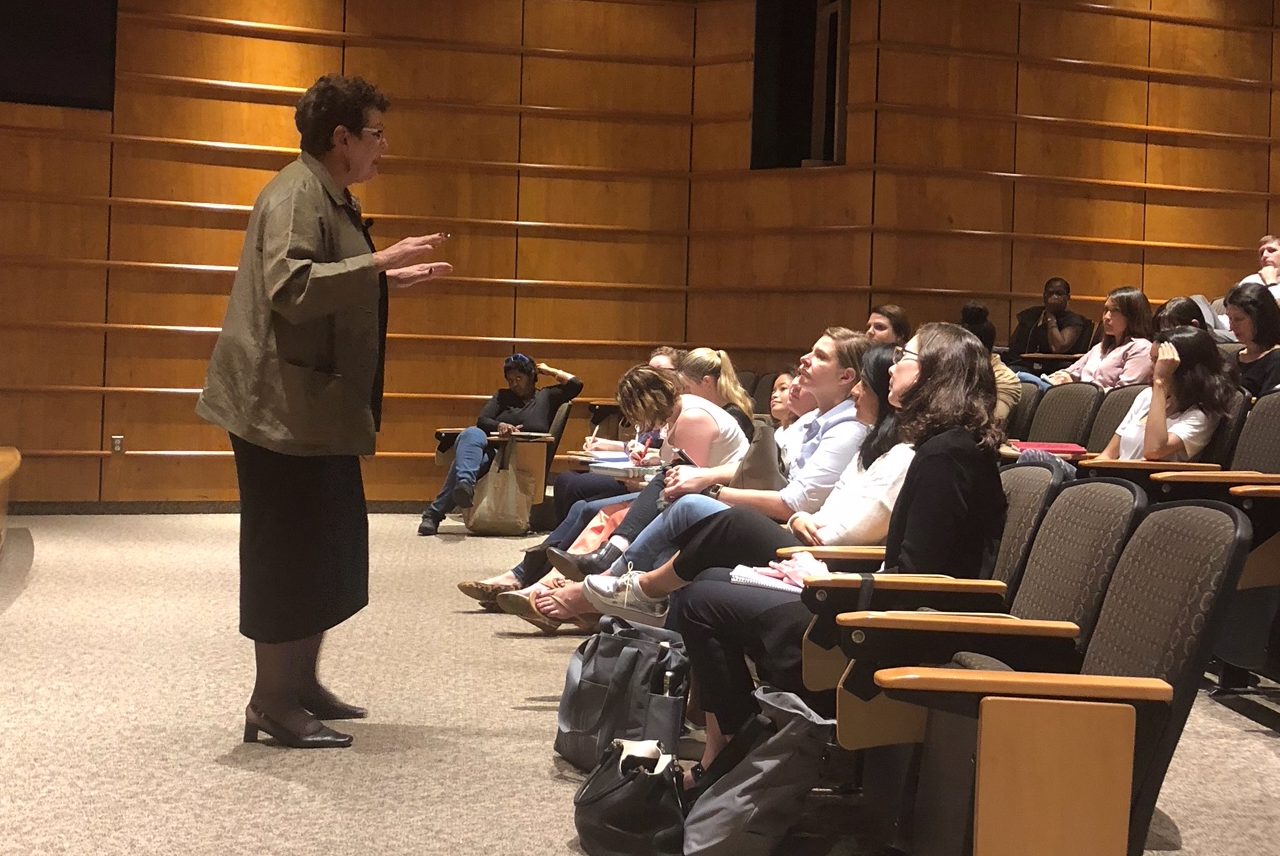Interior design students consider the future of design with Cynthia Leibrock

By: Daniel Schrei and Ahmad Abumraighi
Photos: Ahmad Abumraighi
Award winning Interior Designer, Cynthia Leibrock visited Marymount University to speak on her universally designed home in Colorado, but not before sharing a meal with select students and faculty and giving a guest lecture on aging in place.
 “This lecture is one of many events and initiatives sponsored and undertaken by the Department of Interior Design which contribute to Marymount’s mission arising from that of our founders, the Religions of the Sacred Heart of Mary or RSHM,” said Christina Clark, who is the Dean of Design, Arts, and Humanities. “The Religious of the Sacred Heart of Mary, from their founding in the mid-19th century, have focused on responding to the needs of the time, working with others in action for justice, so that “all may have life, and have it to the full.” In particular, they have worked to help and empower marginalized people and promote dignity and respect for all.”
“This lecture is one of many events and initiatives sponsored and undertaken by the Department of Interior Design which contribute to Marymount’s mission arising from that of our founders, the Religions of the Sacred Heart of Mary or RSHM,” said Christina Clark, who is the Dean of Design, Arts, and Humanities. “The Religious of the Sacred Heart of Mary, from their founding in the mid-19th century, have focused on responding to the needs of the time, working with others in action for justice, so that “all may have life, and have it to the full.” In particular, they have worked to help and empower marginalized people and promote dignity and respect for all.”
“Cynthia Leibrock’s Mission to improve health and longevity through universal design, and the topic of her lecture today, align with and support Marymount to Mission,” Clark said.
Universal design is the design of buildings, products or environments to make them accessible to all people, regardless of age, disability or other factors. Cynthia used this as a mission statement when designing her personal home in Colorado, ensuring every detail of the home was fully accessible to all.
In her guest lecture, Leibrock emphasizes universal design by using six principles, aptly abbreviated “The ABC’s of Universal Design.” The principles are:
A- Accessible route from arrival
B- Bathrooms and Kitchens
C- Controls (hand controls throughout the house, i.e. doors and appliances)
D- Doors
E- Electrical, Mechanical, Acoustical (lighting, flooring, controlling ambient noise)
F- Furniture and Finishes
 Though generally known as “universal design,” Cynthia always referred to these principles as “smart design.” She made that distinction because when one is designing for all abilities, nearly all possible questions of accessibility and inclusion are answered. As she stated numerous times during her lecture, “It’s just the right thing to do.”
Though generally known as “universal design,” Cynthia always referred to these principles as “smart design.” She made that distinction because when one is designing for all abilities, nearly all possible questions of accessibility and inclusion are answered. As she stated numerous times during her lecture, “It’s just the right thing to do.”
Here at Marymount University, we are attempting to shift the focus of our Optimal Aging initiative to discover innovative ways to solve day to day issues older adults face through design. With more than 10% of the Arlington population being older adults, universal design has been an increasing necessity.
Universal design is not limited to any one group of people. As designers and educators, we must do our part in educating clients that universal design is for everyone and respects the human needs in all stages of life.
“We spend our lives in the built environment; ethically responsible design such as Universal Design meets the needs of our time, supporting the RSHM’s, and Marymount, mission,” Clark said.
Starting Fall 2018, Marymount University’s falls prevention program has developed a new initiative called Optimal Aging. The initiative aims to make Arlington an age-friendly city by connecting college students with senior citizens through creating volunteer opportunities with provided care, support, and engagement to assist with life-altering changes caused by aging.
 The Banner
The Banner